Unit 2 What time do you go to school Section B 3a-SelfCheck 课件(人教新目标七年级下)
人教版七下 Unit 2 What time do you go to school?知识点总结

Unit 2 What time do you go to school?必背短语get up 起床 get home到达家中 get to work到达工作岗位 make breakfast做早饭make a shower schedule做一个洗澡的安排 practice guitar 练吉它 leave home 离家take a shower = have a shower 洗淋浴澡 take the Number 17 bus to the Hotel 乘17路公共汽车去旅馆go to class 上课 go to school 上学 go to work 上班(反义词 go home)have breakfast/dinner/lunch吃早晚午饭put on 穿衣服(反义词take off) do one’s homework 做家庭作业tell sb. about sth. 告诉某人某事 tell sb. to do sth. / tell sb. sth.know about sth. 知道某方面的情况 love to do/doing = like to do/doing 喜欢干某事listen to the early morning news on radio 听电台早间新闻 listen to 听…watch the early morning news on TV 看电视早间新闻around six o’clock 六点左右 in the morning 在早上 in the afternoon 在下午 in the evening 在晚上考点解析※get up 起床 eat breakfast=have breakfast 早餐(三餐前省略冠词)have三餐吃…..※job与 work job与 work 都是指工作,但job是可数名词,work是不可数名词. a job 一份工作 work 可以做动词讲,但是job不可以※Life 生活 lives (复数) health健康 healthy健康的 healthily健康地unhealthy 不健康的 keep health 保持健康 healthy food 健康食品have a healthy life =live a healthy life 过着健康的生活※3个穿的区别:wear 表状态,接服装、手套、眼镜、香水等 put on 表动作,接服装dress 表动作,接sb/ oneself get dressed穿衣语法精讲1,问时间what time或者when what time询问具体时间(几点几分) when:时间、日期、年份、月份等提问2,take a shower=have a shower 沐浴3,at a radio station 在广播电台 from……to ……从……到…..(连接两个时间或地点)4,be/ arrive late for :迟到 be late for school5,exercise 锻炼,练习(动、不可数名词) do/take exercise 做锻炼(运动)6,频度副词(实意动词前;be动词后)Always usually often sometimes seldom hardly never★下面的排列更直观地说明了这几个词的频率的"大小"。
人教版七年级下册英语:Unit 2 What time do you go to school知识点讲解及练习题目及答案
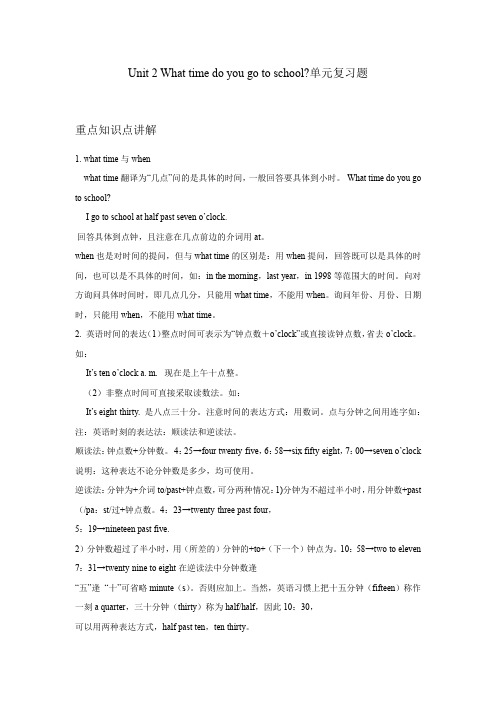
Unit 2 What time do you go to school?单元复习题重点知识点讲解1. what time与whenwhat time翻译为“几点”问的是具体的时间,一般回答要具体到小时。
What time do you go to school?I go to school at half past seven o’clock.回答具体到点钟,且注意在几点前边的介词用at。
when也是对时间的提问,但与what time的区别是:用when提问,回答既可以是具体的时间,也可以是不具体的时间,如:in the morning,last year,in 1998等范围大的时间。
向对方询问具体时间时,即几点几分,只能用what time,不能用when。
询问年份、月份、日期时,只能用when,不能用what time。
2. 英语时间的表达(1)整点时间可表示为“钟点数+o’clock”或直接读钟点数,省去o’clock。
如:It’s ten o’clock a. m.现在是上午十点整。
(2)非整点时间可直接采取读数法。
如:It’s eight-thirty. 是八点三十分。
注意时间的表达方式:用数词。
点与分钟之间用连字如:注:英语时刻的表达法:顺读法和逆读法。
顺读法:钟点数+分钟数。
4:25→four twenty-five,6:58→six fifty-eight,7:00→seven o’clock 说明:这种表达不论分钟数是多少,均可使用。
逆读法:分钟为+介词to/past+钟点数,可分两种情况:1)分钟为不超过半小时,用分钟数+past (/pa:st/过+钟点数。
4:23→t wenty-three past four,5:19→nineteen past five.2)分钟数超过了半小时,用(所差的)分钟的+to+(下一个)钟点为。
10:58→two to eleven 7:31→twenty-nine to eight在逆读法中分钟数逢“五”逢“十”可省略minute(s)。
英语七年级下册语法Unit2What-time-do-you-go-to-school

Unit 2 What time do you go to school ? 一.What time 什么时候,几点钟。
常用于对具体的(确切的)时间提问,也可用when来替换,但反之不一定行。
1. What time/ When do you get up in the morning?I get up at six o’clock in the morning.2. What time is it ? / What’s the time ?It’s six-thirty. / It’s half past six.二.★关于时间的表达法:顺读法,逆读法。
1. 顺读法:按汉语的习惯,先说点后说分的方法。
结构:点+分。
5:10 five-ten 8:30 eight-thirty9:46 nine forty-six 1:05 one-five整点的读法:基数词+o’clock7:00 seven o’clock 12:00 twelve o’clock2. 逆读法:借助介词past或to, 先说分后说点的方法,其结构为:分+past/to +点past 过to 差①当分钟数小于或等于30分钟时,用介词past表示。
7:05 five past seven 6:30 thirty past six =half past six30 thirty=half an hour 11:25②当分钟数大于30时,用介词to表示:几点差几分。
其结构为:(60-分)+to +(点+1)11:50 ten to twelve 9:45 fifteen to ten =a quarter to ten7:55 3:35hour 小时minute 分second 秒quarter 一刻钟写出同义句:seven thirty = ____ ____ seven eight forty = ____ ______ nine 三.★感叹句What a funny time to eat breakfast !What a lucky guy!定义:表示喜怒哀乐等强烈感情的句子叫感叹句。
七下英语Unit-2-What-time-do-you-go-to-school知识要点
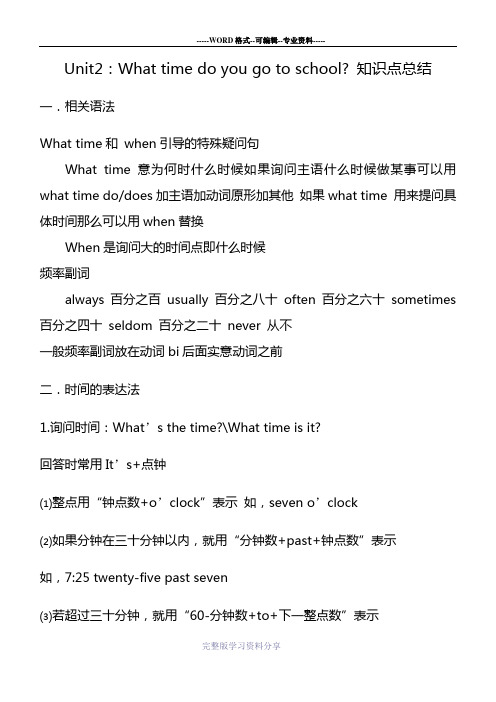
Unit2:What time do you go to school? 知识点总结一.相关语法What time和when引导的特殊疑问句What time意为何时什么时候如果询问主语什么时候做某事可以用what time do/does加主语加动词原形加其他如果what time 用来提问具体时间那么可以用when替换When是询问大的时间点即什么时候频率副词always 百分之百usually 百分之八十often 百分之六十sometimes 百分之四十seldom 百分之二十never 从不一般频率副词放在动词bi后面实意动词之前二.时间的表达法1.询问时间:What’s the time?\What time is it?回答时常用It’s+点钟⑴整点用“钟点数+o’clock”表示如,seven o’clock⑵如果分钟在三十分钟以内,就用“分钟数+past+钟点数”表示如,7:25 twenty-five past seven⑶若超过三十分钟,就用“60-分钟数+to+下一整点数”表示如,7:40 twenty to eight⑷若为三十分钟,用half表示;若为十五分钟,用a quarter如,7:30 half past seven7:15 a quarter past seven如,10:20a.m.=10:20 in the morning3:10p.m.=3:10 in the afternoon4.What time do you usually get up?what time对时间点进行提问,when提问大时间5.What time dose Rick eat breakfast?—At seven o’clock.What time+do\does+主语+动词原形+其他?at既可用来表示时间,又可用来表示方位。
表示事件时,后面一般跟表示具体时间的词;表示方位时,指某人或某物所在之处。
【拔高教育】七年级英语下册 unit 2 what time do you go to school短语、语法知识点汇总
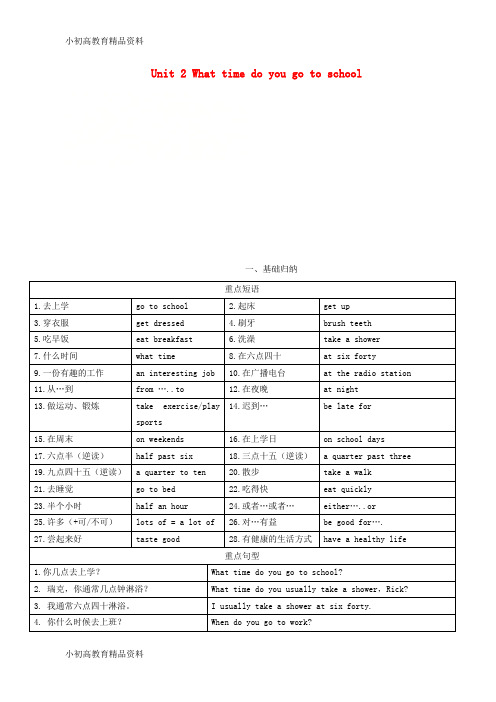
Unit 2 What time do you go to school一、基础归纳【教材内容解析】Section A1.get dressed (P. 7)get dressed意为“穿上衣服”,dress用作动词,表示“给(某人)穿衣服”,接宾语时,只能接表示人的名词或者代词。
He can’t dress himself.I usually dress my daughter before I go to work.【拓展】辨析wear, put on和dress2.take a shower (P. 7)take a shower意为“洗淋浴”,相当于have a shower,shower用作名词,表示“淋浴”。
I often take a shower in the evening.I take a cold shower when I feel tired.3.What time do you usually get up, Rick? (P. 7)(1)what time用来询问具体的时间点,表示“什么时候”。
What time do you go to school?(2)usually是频度副词,意为“通常、一般”,在句中作状语,一般位于实义动词之前,连系动词be、助动词或者情态动词之后。
I usually have lunch at school.He usually goes to school by bike.4.I never get up so early. (P. 8)early此处用作副词,表示“很早地”,反义词为late,意为“晚地”。
Please come to school early tomorrow.【拓展】early还可以用作形容词,表示“早的、提前的”,反义词是late,意为“晚的”。
He gets up early to catch the early bus.5.Scott has an interesting job. (P. 8)job用作可数名词,表示“工作”,强调具体的职业或者工作,work表示“工作”时,用作不可数名词,指人们日常生活和工作中从事的体力或者脑力劳动,及各类工作。
最新初一下册英语-Unit2-what-time-do-you-go-to-school知识点--练习和答案

教师辅导讲义教学内容新课知识◆短语归纳1. what time 几点2. go to school 去上学3. get up 起床4. take a shower 洗淋浴5. brush teeth 刷牙6. get to 到达7. do homework 做家庭作业8. go to work 去上班9.go home 回家10. have/eat breakfast 吃早饭11. get dressed 穿上衣服12.get home 到家13. either…or… 要么…要么… 14. go to bed 上床睡觉15.get dressed 穿上衣服16.go to school 去上学17.radio station 广播电视台18. take a walk 散步19. lots of=a lot of 许多,大量20. at night 在晚上21. be late for=arrive late for 迟到22.go shopping 去购物23.go on 继续24.go back 返回25.go over 仔细检查25. go away 离开26. in the morning/ afternoon/ evening 在上午/下午/晚上◆用法集萃1. at + 具体时间点在几点(几分)2. eat breakfast/ lunch/dinner 吃早饭/午饭/晚饭3. thirty\half past +基数词……点半4. fifteen\a quarter to +基数词差一刻到……点5. take a/an +名词从事……活动6. from …to … 从……到……7. need to do sth 需要做某事◆典句必背1. —What time do you usually get up? 你一般什么时候起床?—I usually get up at six thirty. 我通常6:30分起床。
七年级下册unit2-What-time-do-you-go-to-school-知识点讲解与练习

1.What time do you get up?释:这是一个由疑问词what time(几点)引导的特殊问句。
其结构:What time +助动词do/does +主语+动词原形,询问某人做某事的具体时间。
例如:what time do you begin class in the morning?你们早晨几点开课?注:What’s the time=What time is it?也是用来询问时间,意为“几点了”。
用it作答。
例如:What’s the time? It’s 7:30.几点了?七点半了。
2.I usually get up at five o’clock. 我通常在五点钟起床。
释:1)句中usually与often 一样都是频度副词,常用于动词be 之后,行为动词之前。
always意思是“总是”、“永远”,表示动作重复,状态继续,中间没有间断,通常用来修饰动词的一般时态。
例如:We always get up before six o'clock.我们总是六点前起床。
若修饰动词进行时,则有“老是”,“再三地”的意思,带有厌烦、不满、赞美等感情色彩。
例如:You are always coming late.你老是迟到。
(含有责备的意思)He is always thinking of others.他总是想着别人。
usually(75%)意为“通常”,着重表示已习惯的动作。
反义词为:unusually。
例如:They usually have four classes in the morning.他们上午通常上四节课。
They usually do some shopping on Sunday.他们通常星期天买东西。
often(50%)意为“时常”、“经常”,表示常常这样,但不总是这样,反义词为:seldom。
例如:She often helps her mother with her housework after school.放学后她常常帮助母亲做家务。
Unit 2 What time do you go to school译

Unit 2 What time do you go to school? 1.他大约早上在5:45穿衣服。
2.-吉姆在所学的晚上什么时候洗淋浴?-大约8:15.3.她在电台有个有趣的工作。
4.那个时间吃早饭真有意思呦。
5.晚上,他要么看电视要么玩电脑游戏。
6.要么你要么他经常吃冰激凌。
7.我妹妹有时上课迟到。
8.周末他们要锻炼两个小时。
9.蔬菜对身体有好处,但不好吃。
10.他通常在星期六快速的吃完晚餐,然后去散步。
11.他经常吃水果来保持健康。
12.我喜欢早起。
13.打完羽毛球之后,他开始做作业。
14.他没时间吃早饭。
15.他爸经常在早饭后刷牙。
1穿衣服。
five inthe morning.-:15.does Jim a shower nights?about eight fifteen/.3.她在电台有个有趣的工作。
She has an interesting job4.那个时间吃早饭真有意思呦。
That’s a fuuny time for/to eat breakfast.5.in theevening/at night.7.我妹妹有时上课迟到。
My sister is sometimes late for class.8.9.health,but they don’10.and11.12.13.He started doing his homework15.often。
人教版七年级英语下复习Unit2 What time do you go to schoo

(2013·山东潍坊)When did the terrible earthquake happen in Sichuan? It happened_____8:02____the morning of April 20th,2013.
A.on;in B.at;on C.at;in D.on;on
go home 回家 letter n.信
around adv.大约
start v.开始;出发 write v.书写;写
tell v.告诉;讲述 me pron.我(I的宾格)
soon adv.不久
wish n.希望;祝愿
best (good,well最高级)最好的(地)
Saturday n.星期六 am (a.m.)上午 survey n.调查;考察
o’clock adv.(只用于正点)......点钟 work v.&n. 工作
hour n.小时 brush v.刷
teeth n.(tooth复数)牙齿
after 在......之后 go to work 去上班
get to 到达
bus n.公共汽车 hotel n.旅馆
all prep.全部;全体
in May in summer in 2011
介词on用在日期、星期几、节日前,也可表示具体
某一天的早上、下午、晚上等。
usually 频率副词 usually: 频度副词,意为“通常”。
在句中作状语,一般位于实义动词之前, 系动词、助动词或情态动词之后。
Eg: I usually have lunch at school.
逆读法: 借助介词past或to 。 小于等于30分钟:分钟+past+小时 几点过几分
人教版七年级英语下册Unit 2 What time do you go to school知识点归纳总结

Unit 2 What time do you go to school?◆短语归纳1. what time 几点2. go to school 去上学3. get up 起床 go to bed 上床睡觉(反义词get up )4. take a shower = have a shower 洗淋浴5. brush teeth 刷牙6. get to 到达7. do homework 做家庭作业 8. go to work 去上班(反义词 go home )9. go home 回家 10. eat breakfast 吃早饭 11. get dressed 穿上衣服12. get home 到家13. either…or… 要么…要么… 14. make breakfast 做早饭15. in the morning/ afternoon/ evening 在上午/下午/晚上 16. take a walk 散步17. lots of=a lot of 许多,大量 18. radio station 广播电台 19. at night 在晚上20. be late for=arrive late for 迟到21.make a shower schedule 做一个洗澡的安排22. have breakfast/dinner/lunch 吃早晚午饭 23.get to work 到达工作岗位24.practice guitar 练吉它25.leave home 离家26.go to class 上课27.take the Number 17 bus to the Hotel 乘17路公共汽车去旅馆◆用法集萃 ◆典句必背 1. What time do you usually get up? I usually get up at six thirty. 2. That’s a funny time for breakfast. 3. When do students usually eat dinner? They usually eat dinner at a quarter to seven in the evening.4. In the evening, I either watch TV or play computer games.5. At twelve, she eats lots of fruit and vegetables for lunch..6. She knows it’s not good for her, but it tastes good.7. Here are your clothes.◆语法1. at + 具体时间点 在几点(几分)2. eat breakfast/ lunch/dinner 吃早饭/午饭/晚饭3. thirty\half past +基数词 ……点半4. fifteen\a quarter to +基数词 差一刻到……点5. take a/an +名词 从事……活动6. from …to … 从……到……7. need to do sth 需要做某事8.around six o’clock 六点左右9.tell sb. about sth. 告诉某人某事 tell sb. to do sth. / tell sb. Sth. 10.know about sth. 知道某方面的情况 11.love to do/doing = like to do/doing 喜欢干某事 12.Listen to the early morning news on radio 听电台早间新闻 13.watch the early morning news on TV 看电视早间新闻1、英语时间的表达(1)整点时间可表示为“钟点数+o’clock”或直接读钟点数,省去o’clock。
Unit 2 What time do you go to school知识梳理

Unit 2 What time do you go to school? 知识梳理重点短语及句子:1、either…or… 要么……要么;或者……或者2、lots of 大量;许多3、at half past six 在六点半4、a quarter past eight 八点一刻5、a quarter to ten 十点差一刻6、do homework 做作业7、take a walk散步8、be good for 对……有益9、play sports做运动10、get up 起床;站起11、go to school上学12、get dressed 穿上衣服13、brush teeth 刷牙14、take a shower 洗沐浴15、eat breakfast 吃早饭16、at a radio station 在广播电台17、on weekends(在)周末18、be later for 迟到19、I don’t have much time for breakfast. 我没有很多时间吃早饭。
20、after school 放学后after class 下课后21、half an hour 半小时22、get home 到家23、get on上车24、Either he or I am going shopping with Mother. 不是他就是我要和妈妈一起去购物。
25、do one’s homework 做作业26、take a walk;go for a walk 散步27、brush teeth 刷牙(man –men 男人woman –women女人tooth-teeth牙齿foot-feet脚mouse-mice老鼠)28、时刻表示:7:20 seven twenty 9:45 nine forty-five 10:30 ten thirty 或half past ten6:45 six forty-five 或fifteen to seven 29、Scott has an interesting job 斯科特有一份有趣的工作。
Unit_2What_time_do_you_go_to_school知识点

Unit 2 What time do you go to school一、高频单词time n. 时间拓展:常用固定搭配:what time 几点,什么时候;还有“次数”的意思,如how many times几次;例句:What time do you go to school? 你什么时候去学校?shower n. 淋浴;淋浴器拓展:常用固定搭配:take a shower= have a shower 洗澡。
shower还可意为“展出者”“阵雨”等。
例句:I want to take a shower. 我要洗个澡。
usually adv. 通常,经常拓展:usually为副词,意为“经常;通常”,表示频率,一般用于实义动词之前,系动词、情态动词、助动词的后面。
例句:What time do you usually get up on Sunday? 你星期天一般几点起床?work v&n. 工作拓展:1)work可作动词,也可做名词,注意work和job的区别:work多指生产或完成某物的体力的或脑力的努力或活动,是不可数名词。
job多指为换取报酬而进行的日常活动,尤指作为职业的工作,是可数名词。
2)派生词:worker n. 工人;workers n. 著作,作品。
3)常用搭配:at work在工作;work out 计算出;work at/on从事于例句:He works in a factory. 他在工厂工作。
hour n. 小时拓展:1)注意读音,在单词中h不发音,因此前面要用an,而不能用a。
2)常用搭配:half an hour 半小时;hour by/ after hour 一小时接着一小时。
例句:There are sixty minutes in an hour. 一小时有六十分钟。
brush v.刷拓展:brush也可作为名词,意为“刷子,擦子”。
例句:You can use this brush to brush your shoes. 你可以用这个刷子刷牙。
Unit2Whattimedoyougotoschool复习资料人教版七年级英语下册
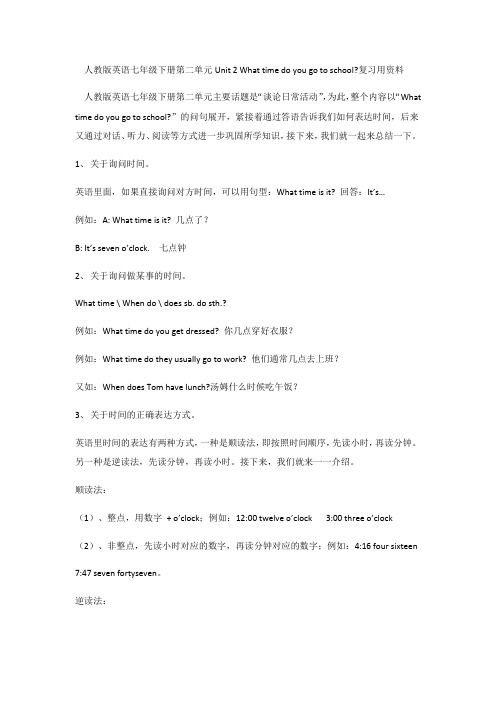
人教版英语七年级下册第二单元Unit 2 What time do you go to school?复习用资料人教版英语七年级下册第二单元主要话题是“谈论日常活动”,为此,整个内容以“What time do you go to school?”的问句展开,紧接着通过答语告诉我们如何表达时间,后来又通过对话、听力、阅读等方式进一步巩固所学知识,接下来,我们就一起来总结一下。
1、关于询问时间。
英语里面,如果直接询问对方时间,可以用句型:What time is it? 回答:It’s…例如:A: What time is it? 几点了?B: It’s seven o’clock. 七点钟2、关于询问做某事的时间。
What time \ When do \ does sb. do sth.?例如:What time do you get dressed? 你几点穿好衣服?例如:What time do they usually go to work? 他们通常几点去上班?又如:When does Tom have lunch?汤姆什么时候吃午饭?3、关于时间的正确表达方式。
英语里时间的表达有两种方式,一种是顺读法,即按照时间顺序,先读小时,再读分钟。
另一种是逆读法,先读分钟,再读小时。
接下来,我们就来一一介绍。
顺读法:(1)、整点,用数字+ o’clock;例如:12:00 twelve o’clock 3:00 three o’clock (2)、非整点,先读小时对应的数字,再读分钟对应的数字;例如:4:16 four sixteen 7:47 seven fortyseven。
逆读法:(1)、当分钟数小于30时,用“分钟对应的数字+ past + 小时对应的数字”,例如:8:12 twelve past eight 9:28 twentyeight past nine 10:08 eight past ten特殊情况:当分钟数等于15时,15可以用英语单词“a quarter来表示”,例如:6:15 a quarter past six;又如:9:30half past nine。
新人教 英语 七年级下册Unit2 What time do you go to school知识点详解

Unit 2 What time do you go to school?知识点详解单元目标总览:【知识点详解】1、What time do you usually get up,Rick?what time 意为“几点;什么时间”,其引导的特殊疑问句用来询问具体的时间点◆---What time do you get up in the morning?你早上几点起床?---At about 7 o’clock.大约在7点。
拓展:what time与whenwhat time翻译为“几点”问的是具体的时间,一般回答要具体到小时。
What time do you go to school? 你什么时候/几点上学?I go to school at half past seven o’clock. 我七点半去上学。
回答具体到点钟,且注意在几点前边的介词用at。
when也是对时间的提问,但与what time的区别是:用when提问,回答既可以是具体的时间,也可以是不具体的时间,如:in the morning,last year,in 1998等范围大的时间,例如:When does he take a shower?他什么时候洗澡?He takes a shower in the morning. 他在早上洗澡。
也可用具体时间:I take a shower at 6 o’clock in the morning. 我早上六点洗澡。
2、get dressed穿上衣服dress做动词,意为“穿衣服”,其宾语多是人,常用短语:dress sb 给某人穿衣服◆The boy can dress himself.这个男孩可以自己穿衣服。
get dressed穿上衣服,表示动作◆Get up and get dressed.起床穿衣服。
be dressed in 穿着,强调状态◆She is dressed in red clothes.她穿着红色的衣服。
Unit2 What time do you go to school
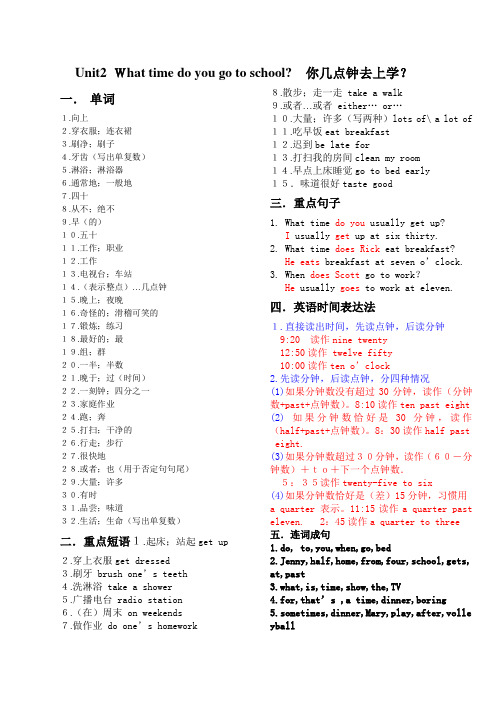
Unit2 What time do you go to school?你几点钟去上学?一.单词1.向上2.穿衣服;连衣裙3.刷净;刷子4.牙齿(写出单复数)5.淋浴;淋浴器6.通常地;一般地7.四十8.从不;绝不9.早(的)10.五十11.工作;职业12.工作13.电视台;车站14.(表示整点)…几点钟15.晚上;夜晚16.奇怪的;滑稽可笑的17.锻炼;练习18.最好的;最19.组;群20.一半;半数21.晚于;过(时间)22.一刻钟;四分之一23.家庭作业24.跑;奔25.打扫;干净的26.行走;步行27.很快地28.或者;也(用于否定句句尾)29.大量;许多30.有时31.品尝;味道32.生活;生命(写出单复数)二.重点短语1.起床;站起get up2.穿上衣服get dressed3.刷牙brush one’s teeth4.洗淋浴take a shower5.广播电台radio station6.(在)周末on weekends7.做作业do one’s homework 8.散步;走一走take a walk9.或者…或者 either… or…10.大量;许多(写两种)lots of\ a lot of 11.吃早饭eat breakfast12.迟到be late for13.打扫我的房间clean my room14.早点上床睡觉go to bed early15.味道很好taste good三.重点句子1. What time do you usually get up?I usually get up at six thirty.2. What time does Rick eat breakfast?He eats breakfast at seven o’clock.3. When does Scott go to work?He usually goes to work at eleven. 四.英语时间表达法1.直接读出时间,先读点钟,后读分钟9:20 读作nine twenty12:50读作 twelve fifty10:00读作ten o’clock2.先读分钟,后读点钟,分四种情况(1)如果分钟数没有超过30分钟,读作(分钟数+past+点钟数)。
Unit 2 What time do you go to school? 重点词组+句型语法+话题
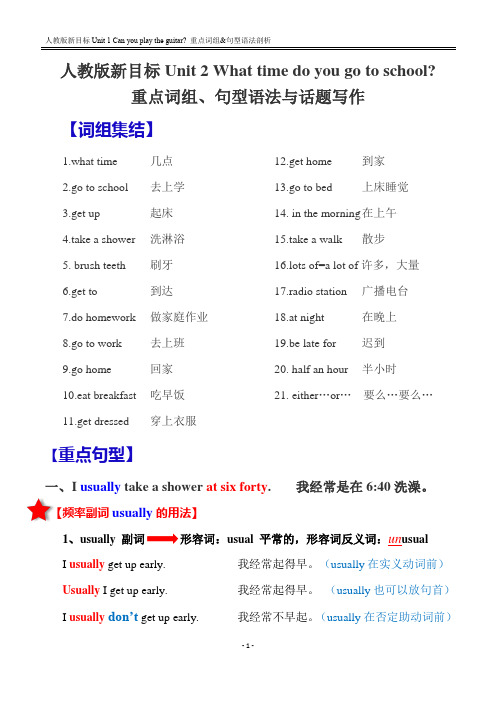
人教版新目标Unit 2 What time do you go to school?重点词组、句型语法与话题写作【词组集结】1.what time 几点2.go to school 去上学3.get up 起床4.take a shower 洗淋浴5. brush teeth 刷牙6.get to 到达7.do homework 做家庭作业8.go to work 去上班9.go home 回家10.eat breakfast 吃早饭11.get dressed 穿上衣服12.get home 到家13.go to bed 上床睡觉14. in the morning 在上午15.take a walk 散步16.lots of=a lot of许多,大量17.radio station 广播电台18.at night 在晚上19.be late for 迟到20. half an hour 半小时21. either…or…要么…要么…【重点句型】一、I usually take a shower at six forty. 我经常是在6:40洗澡。
【频率副词usually的用法】1、usually 副词形容词:usual 平常的,形容词反义词:un usualI usually get up early. 我经常起得早。
(usually在实义动词前)Usually I get up early. 我经常起得早。
(usually也可以放句首)I usually don’t get up early. 我经常不早起。
(usually在否定助动词前)She is usually good to old people. 她通常对老人们很和善。
(usually在be动词后)【频率副词用法顺口溜】实动前,be动后。
2、at six forty 在6:40【时间介词用法】1)at常接时刻;at 6:152)on接特定日期;on Sunday3 ) in表年季月周等; in spring一般规则:除了前两点特殊用法之外,其他≤一天用on,>一天用in,在具体时刻用at。
- 1、下载文档前请自行甄别文档内容的完整性,平台不提供额外的编辑、内容补充、找答案等附加服务。
- 2、"仅部分预览"的文档,不可在线预览部分如存在完整性等问题,可反馈申请退款(可完整预览的文档不适用该条件!)。
- 3、如文档侵犯您的权益,请联系客服反馈,我们会尽快为您处理(人工客服工作时间:9:00-18:30)。
1
taste clean have get take brush
Make phrases with the words in the boxes. your teeth my room a walk good dressed a good job taste good ________________
Number the pictures and make a common daily routine. 3 5 4 8
9
2
10
11
6
7
1Leabharlann Number these sentences in order to 3a make a story about a daily routine. ___ 3 I usually exercise from six to seven. ___ 2 I always get up at six. ___ 5 After that, I always brush my teeth and go to school at eight. ___ 4 Then I quickly have a shower and eat breakfast. ___ 6 I have lunch at a quarter to twelve. ___ 7 I get home from school at half past four and do my homework. ___ 1 I have a very healthy life. ___ 8 I have dinner at seven thirty. ___ 9 I go to bed at ten.
The old women’s lives are very difficult.
那些老年妇女的生活很困难。
3b Write about your own daily
routine.
________________________________
_______________________________ _______________________________ _______________________________ _______________________________ _______________________________ ________________________________
学唱下列歌谣。 Get up, get up. I get up at six. Go to school, go to school, I go to school at seven. Have lunch, have lunch, I have lunch at twelve. Go home, go home, I go home at four. Go to bed, go to bed, I go to bed at night.
taste good, clean my room, have a good job, get dressed, brush your teeth, take a walk 1. Ice-cream usually _____________ so students like to eat it after school. 2. My grandparents are very healthy. They always ___________ after dinner. 3. You need to _______________ after eating to have good teeth.
_______________ clean my room _______________ have a good job
get dressed _______________ _______________ take a walk brush your teeth _______________
Use the phrases to complete the sentences.
afternoon evening
watch TV
go to bed
Tell your classmates about your life on weekends. I have a relaxing weekend. I usually get up at eight. Then I exercise for half an hour. I eat breakfast at nine. I brush my teeth at nine past twenty. I …
写作指导:
回想一下上个环节中自己一天的作息。
按时间的先后,逐条叙述。 注意运用正确的英语表达方式: I+ usually/often+动词短语+at+时间。
One possible version:
I have a healthy life. I usually get up at seven. I exercise from a quarter past seven to half past seven. Then I have breakfast and brush my teeth. I go to school at eight o’clock. I have lunch at twelve o’clock. I get home from school at half past four and do my homework. I have dinner at six then I watch TV. I go to bed at nine thirty.
Talk about your daily routine.
I usually get up at seven o’clock. I exercise…
life作名词,意为“生活”,指生活方式,
是可数名词。其复数形式为lives。
We have a happy life in China.
在中国我们过着愉快的生活。
Think about your weekends’ activities then fill in the blanks.
Activities Time
get up
morning noon exercise eat breakfast have lunch play sports meet friends eat dinner
